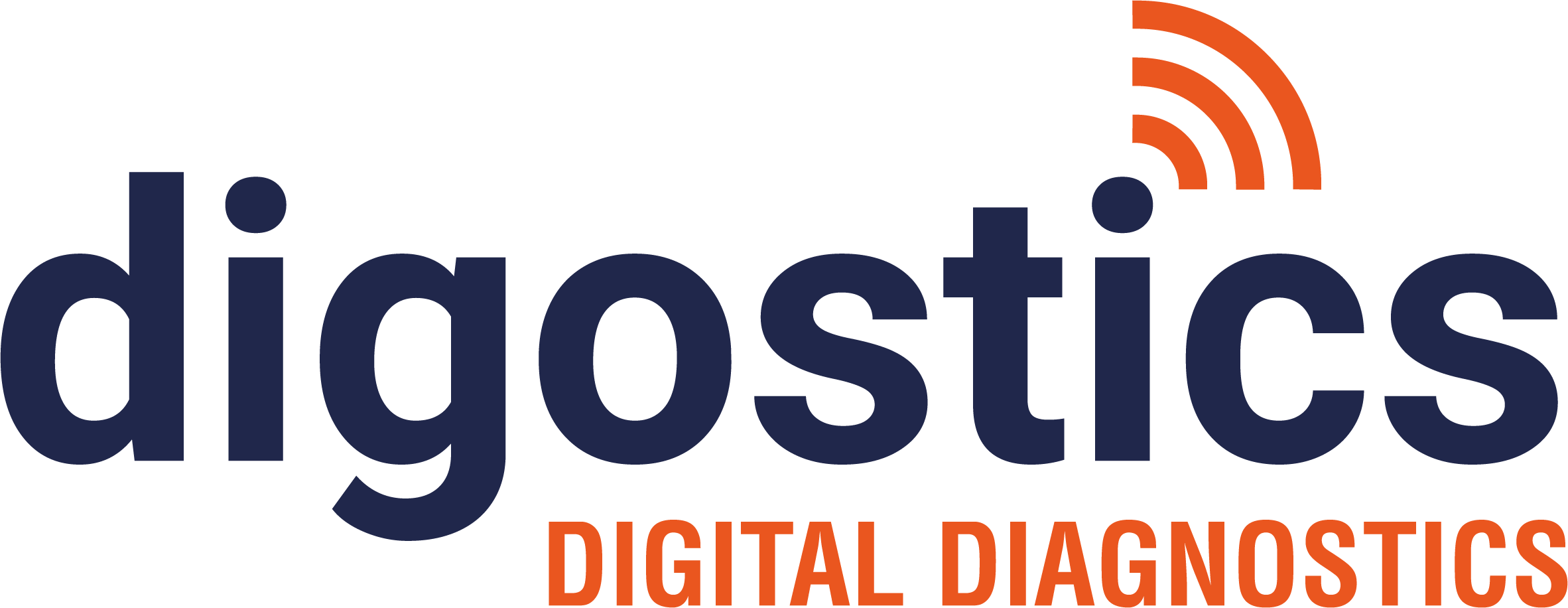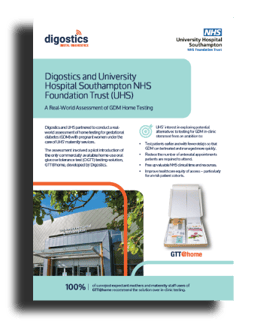University Hospital Southampton's Introduction of Oral Glucose Tolerance Home Testing Improves the Accessibility of Gestational Diabetes Screening for Hampshire Expectant Mothers
University Hospital Southampton's Introduction of Oral Glucose Tolerance Home Testing Improves the Accessibility of Gestational Diabetes Screening for Hampshire Expectant Mothers
World-First Introduction of Home Oral Glucose Tolerance Testing Service for Gestational Diabetes Sees University Hospital Southampton Improve Test Accessibility and Yield Maximum User Preference Scores.
World-First Introduction of Home Oral Glucose Tolerance Testing Service for Gestational Diabetes Sees University Hospital Southampton Improve Test Accessibility and Yield Maximum User Preference Scores.
NHS Hospital Trust Pilot of New Testing Technology Sees Pregnant Women in Southampton Become the First Patients Globally to Access Gestational Diabetes Testing at Home.
Oxford, United Kingdom 21/02/2024 – Digital clinical diagnostics and diabetes home testing provider Digostics revealed today the results from its ground-breaking gestational diabetes mellitus (GDM) remote screening collaboration with University Hospital Southampton NHS Foundation Trust (UHS), a partnership that saw expectant mothers in Hampshire become the first globally to access the gold standard oral glucose tolerance test (OGTT) without needing to attend clinic.
The initiative, first announced in April 2023, saw women assessed as at risk of developing GDM by their midwife issued with a GTT@home test kit from Digostics to undertake their OGTT at home. The service’s introduction saw all women successfully tested in their target test week. Furthermore, 100% of mothers and maternity staff who responded to user surveys recommended GTT@home over traditional clinic testing.
The implementation of GTT@home stemmed from an ambition by UHS to improve the quality of the test and to test in a more patient-focused way. Additionally, to enable testing to be undertaken more quickly so that treatment can be initiated sooner where required. Objectives also included reducing the number of antenatal appointments required, freeing up valuable resources and improving healthcare equity of access, particularly for at-risk patient groups.
“We are constantly trying to balance the critical importance of OGTT provision with the significant human resource and administrative demands in-clinic OGTTs place on us as a busy team,” said Rachel Hanley, Community Service Matron, UHS. “GTT@home has demonstrated that there is finally another way, one that not only helps ensure prompt and timely access to GDM testing, but that frees up countless valuable midwifery staffing hours to be redirected to other essential antenatal and postnatal activity."
Up to 20%¹ of UK pregnancies are impacted by GDM, with background risk factors including age, ethnicity and body mass index². Undiagnosed or untreated, GDM can lead to pregnancy complications that warrant unscheduled or even emergency changes to the birth-plan to protect both mother and baby. GDM also confers an increased risk for both mother³ and child† of developing Type 2 diabetes later in life and accurate diagnosis with a reliable test is therefore important.
Prior to the implementation of GTT@home, undertaking an OGTT would require women to travel, while fasted, to a dedicated clinic on a specific date and spend over two hours at the hospital. The inconvenience the in-clinic test represents, especially for example for those with childcare pressures, means missed appointments and late tests are frequent. 97% of those using GTT@home found the ability to home test advantageous, with the same percentage welcoming the flexibility to choose which day they tested. 90% found the GTT@home test device easy to use, with no one finding it difficult to use.
“The contribution GTT@home has made to improving OGTT test patient empowerment, equity and accuracy will enable improved care for our patients when GDM is suspected and detected,” said Dr Matthew Coleman, Consultant Obstetric Physician at UHS. “In equal parts, we are excited that this revolutionary new at-home test is going to dramatically change the way we deliver GDM testing during antenatal care.”
UHS Case Study
Download the full real-world assessment of UHS' implementation of GDM home testing.
In a significant improvement from the in-clinic workflow, which typically sees blood samples only sent to the laboratory for analysis once the final test of the day has been completed, GTT@home ensures both blood tests associated with the OGTT – the initial fasting test and the two-hour test after consumption of a glucose drink – are analysed immediately at the point of testing. This eliminates the sample degradation that can occur between in-clinic blood sampling and laboratory analysis with the traditional OGTT.
After completing a test with GTT@home, the user can send their test data directly to their antenatal care team with a simple scan of a snap-off fob attached to the innovative test device using the GTT@home mobile app and the near field communication (NFC) functionality within their smartphone. Although users can send their test data via a prepaid envelope in the test kit, 98% elected to send their data via their smartphone, with their results available for review by their midwife much faster than could be achieved via the hospital laboratory.
“UHS’ pilot implementation of GTT@home has shown that OGTT home testing is not just a viable alternative to in-clinic testing but a significantly more accessible way to screen women for diabetes and potentially improve test accuracy,” said Professor Richard Holt, Professor in Diabetes and Endocrinology, University of Southampton.
After the successful pilot of GTT@home at UHS, NHS trusts and health boards nationwide are looking to introduce GTT@home for their pregnant women in 2024. UK-headquartered Digostics is also setting up operations in the Middle East and Asia Pacific to meet the significant demand for GTT@home in these regions and aims to expand to Europe and the USA.
“The results achieved by UHS in having the vision to eliminate barriers to effective GDM screening by taking diabetes testing directly to the mum-to-be speak for themselves,” said James Jackson, CEO and Founder of Digostics. “We congratulate our partners at UHS on the success of their GTT@home implementation and for breaking exciting new ground in both global diabetes innovation and women’s health.”

Click the button below for our GTT@home for gestational diabetes page featuring:
• user instructional videos
• expectant mother and maternity staff user testimonials
• guidance on how to streamline the OGTT workflow
• tips on getting started with OGTT home testing

Click the button below for more GTT@home product-specific information featuring:
• user instructional videos
• expectant mother and maternity staff user testimonials
• guidance on how to streamline the OGTT workflow
• tips on getting started with OGTT home testing
About Digostics
Far too many people across the world are living with undiagnosed diabetes.
UK-based Digostics' mission is to enable healthcare providers to identify everyone with diabetes, and those at risk of developing diabetes, by eliminating the common barriers that inhibit accurate and timely testing using the gold standard oral glucose tolerance test (OGTT).
Digostics is proud to offer GTT@home - the world’s first home OGTT offering and the most accessible and scalable way for clinical teams to realise their diabetes testing objectives.
To learn more, visit www.digostics.com
About University Hospital Southampton NHS Foundation Trust
University Hospital Southampton NHS Foundation Trust provides services to some 1.9 million people living in Southampton and south Hampshire, plus specialist services such as neurosciences, cardiac services and children's intensive care to more than 3.7 million people in central southern England and the Channel Islands.
UHS is one of the largest acute teaching trusts in England with a staff of 13,000 and a turnover of more than £1bn in 2020/21.
We are one of only two major trauma centres in the South of England for both adults and children.
UHS is consistently one of the UK’s highest recruiting trusts of patients to clinical trials.
About The University of Southampton
The University of Southampton drives original thinking, turns knowledge into action and impact, and creates solutions to the world’s challenges.
We are among the top 100 institutions globally (QS World University Rankings 2023). Our academics are leaders in their fields, forging links with high-profile international businesses and organisations, and inspiring a 22,000-strong community of exceptional students, from over 135 countries worldwide.
Through our high-quality education, the University helps students on a journey of discovery to realise their potential and join our global network of over 200,000 alumni. www.southampton.ac.uk
Could GTT@home be of assistance to your patients?
Please get in touch by completing the form below or calling us on +44 (0)330 113 9145.

